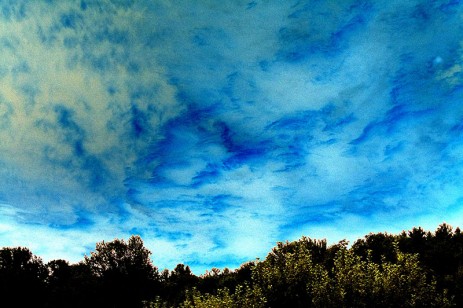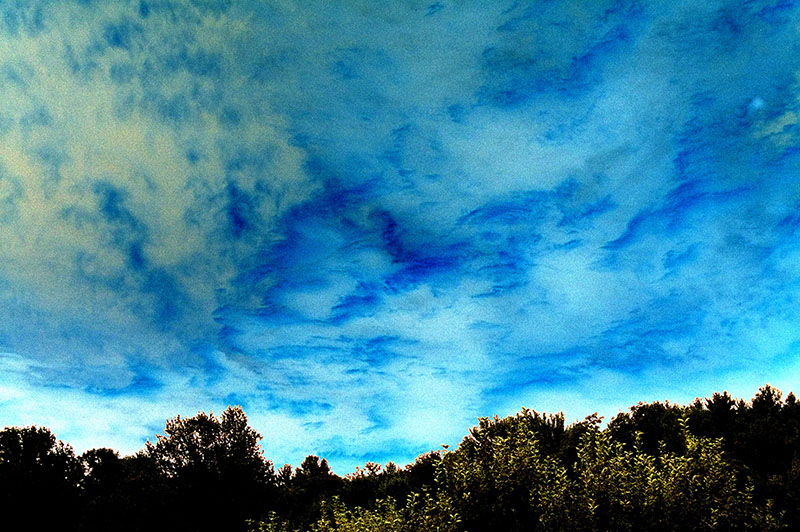 Photo: Adam D. SacksIn “The Fallacy of Climate Activism,” I suggest that we as climate activists are not telling the unadulterated truth — which seems to worsen daily — to the public. This is one critically important reason we’re making so little progress in changing behavior and politics commensurate with the drastic acceleration of global warming. We have hurled ourselves far beyond the point where simply reducing greenhouse-gas emissions will make a difference that makes a difference.
Photo: Adam D. SacksIn “The Fallacy of Climate Activism,” I suggest that we as climate activists are not telling the unadulterated truth — which seems to worsen daily — to the public. This is one critically important reason we’re making so little progress in changing behavior and politics commensurate with the drastic acceleration of global warming. We have hurled ourselves far beyond the point where simply reducing greenhouse-gas emissions will make a difference that makes a difference.
Having examined some of the what of our missteps in “Fallacy,” in this piece I take a look at some of the how: the timid, tentative, emotionally impoverished voice of our communications, the feelings unexpressed in the face of the premature and squalid end of so much of what we love, the unfathomable reluctance to speak to the depth of the grief we are bringing upon ourselves.
Global climate disruption — having graduated in short order from a spectre a century away to a battering present-day reality — foreshadows the demise of civilization, the failure of our life-support systems, and even, perhaps, the end of most life on earth. Yet most industrialized humans, to date, remain largely unaware and only marginally concerned. This is a remarkable puzzle, and were we to solve it perhaps we would take a major step toward addressing the climate catastrophe.
I offer you a key puzzle piece: The end of all that we have known is an unthinkable thought,[1] as are so many unprecedented abrupt and catastrophic events.[2] When a thought is unthinkable, it is invisible even when writ large — we simply can’t see it, even when we have reason to try.[3] If we do see it, it quickly falls from awareness. If, finally, we accept it, perhaps after months or years of getting used to the idea, we find that we’re alone, mostly talking to ourselves.
Then, when the reality strikes us all irrefutably, undeniably, without mercy, we are completely unprepared, asking incredulously, “Why didn’t somebody tell us?”
And what hasn’t been told?
To date, most of our arguments about the reality of global warming have been data-driven, psychically tepid litanies of climate science and industrial “solutions,” peppered with the heartstring-tugging of cute polar bears and sad stories of people in distant lands whom we don’t care about very much (well, of course we care, but we don’t know them and there’s nothing we can do to help anyway, except perhaps changing lightbulbs). Coastal insalination rendering vast swaths of farmland useless, houses plunging into the sea as permafrost melts, even wildfires threatening the City of the Angels, to name just a very few — these are far, far away and don’t really affect us. Or we don’t see it. (Yet.)
We climate activists are the ones who aren’t saying what needs to be said.[4] Our silence is not the lack of words, it is the absence of an essence in urgent human relationships, an essence with power to break the bonds of unthinkable thoughts:
Passion.
To illustrate, I would like to reproduce for you an excerpt from one of my favorite speeches of the 19th century. It is entitled “What to a Slave Is the Fourth of July,” and was delivered by Frederick Douglass before the Rochester Ladies’ Anti-Slavery Society on July 5, 1852 (he refused to speak on July 4, for reasons that will quickly become apparent). Douglass, as you may remember, was one of the great political thinkers and orators of that horrific era, an escaped slave who taught himself to read and went on to become an erudite, articulate, and passionate abolitionist, a writer, a sought-after speaker, and a guest of President Lincoln.
Here are his words:
… What, am I to argue that it is wrong to make men brutes, to rob them of their liberty, to work them without wages, to keep them ignorant of their relations to their fellow men, to beat them with sticks, to flay their flesh with the lash, to load their limbs with irons, to hunt them with dogs, to sell them at auction, to sunder their families, to knock out their teeth, to burn their flesh, to starve them into obedience and submission to their masters? Must I argue that a system thus marked with blood, and stained with pollution, is wrong?
… What, then, remains to be argued? Is it that slavery is not divine, that God did not establish it; that our doctors of divinity are mistaken? There is blasphemy in the thought. That which is inhuman, cannot be divine!! Who can reason on such a proposition? They that can, may; I cannot. The time for such argument has passed. At a time like this, scorching irony, not convincing argument, is needed. O! had I the ability, and could reach the nation’s ear, I would, today, pour out a fiery stream of biting ridicule, blasting reproach, withering sarcasm, and stern rebuke. For it is not light that is needed, but fire, it is not a gentle shower, but thunder. We need the storm, the whirlwind, and earthquake. The feeling of the nation must be quickened; the conscience of the nation must be roused; the propriety of the nation must be startled; the hypocrisy of the nation must be exposed; and its crimes against God and man must be proclaimed and denounced.
What, to the American slave, is your Fourth of July? I answer: a day that reveals to him, more than all other days in the year, the gross injustice and cruelty to which he is the constant victim. To him, your celebration is a sham; your boasted liberty, an unholy license; your national greatness, swelling vanity; your sounds of rejoicing are empty and heartless; your denunciation of tyrants, brass fronted impudence; your shouts of liberty and equality, hollow mockery; your prayers and hymns, your sermons and thanksgivings, with all your religious parade and solemnity, are, to him, mere bombast, fraud, deception, impiety, and hypocrisy — a thin veil to cover up crimes which would disgrace a nation of savages. …
Well …
Today we are addressing the end of the world we know, quite possibly the extinction of homo sapiens and most other species on earth, and we can do little more than cite statistics?[5] Surely an unravelled web of life, miserable ends for countless creatures great and small, and mass death of billions of human beings, mostly innocent, should call for “scorching irony,” at the very least.
Where are our fire, thunder, ridicule, blasting reproach, withering sarcasm, stern rebuke? Why are we so polite?[6] Why are we so obedient? What are we thinking? What aren’t we thinking? What are we doing? What aren’t we doing? When do we start? [7]
I have a proposition for you. Try your hand at a letter — to an editor, or to a friend, or to a lover, or to a child — availing yourself of all the passion you can muster as we hasten blindly toward world’s end. Post it here for all to ponder — then we’ll send the collection to everyone we know, far and wide.
When do we start? Now’s the time.
Quill and ink (or keyboard) in hand, summon your muse and write for our lives!
—
Endnotes:
[1] Timothy C. Weiskel, “Selling Pigeons in the Temple: The Danger of Market Metaphors in an Ecosystem,” Harvard Seminar on Environmental Values, Harvard Divinity School, July 6, 1997. “In democratically organized societies thought is not overtly censored. We are not forbidden to think about particular topics, but thought control manifests itself nonetheless in the far more subtle form of self-censorship. It is not what it is forbidden for us to think, but rather what it does not occur to us to think, that establishes the bounds of publicly acceptable thought in democratic society.”
[2] These could be natural disasters, such as unforeseen volcanic eruptions, hurricanes or changing climate; or the result of human activity such as the overshoot and collapse on Easter Island or the invasion of Europeans and consequent sudden disruption and/or extermination of indigenous peoples and cultures. Prior to such occurrences, few if any members of the affected societies would have been able to envision the outcomes, and if told would likely have given short shrift to such “conspiracy theories.”
[3] John A. Livingston, pioneer environmentalist, preservationist, teacher, and writer, described his experience in addressing the challenges of giving voice to the realities of nature in our technoculture: “It is not that audiences disagree with us or resent our argument or are offended by it: it means that they cannot perceive it [emphasis is Livingston’s]. They literally do not know what we are talking about.” The Fallacy of Wildlife Conservation, in The John A. Livingston Reader, McClelland & Stewart, 2007, p. 61.
[4] The scientists’ job is to be dispassionate analysts and observers, and they are doing it full well. The climate activists’ job is to put the science in the context of real lives, real communities, real future, and communicate with all the means at our disposal. So far, we have screwed it up, but good.
[5] For example, parts per million carbon dioxide is an obsession; necessary fundamental change in the ways we live on earth hardly merits a whisper. And by fundamental change I don’t mean switching to 35 mpg — or even 350 mpg — vehicles. That’s another obsessive and meaningless statistic among the many.
[6] Symptomatic of our wayward rationality is the data-driven response to climate “skeptics,” neo-classical economists, and other toxic relics of an unsustainable culture. They are paragons of delusion and dishonesty, unworthy of scorn and disdain, yet we respond to them as if we were having reasonable conversations with reasonable people. Not everyone will wake up (just ask ark-craftsman Noah), so let’s not waste our time, and spend our energies on the vast majority of people who are concerned about the future and willing to face it — if only we get around to starting a conversation about planetary realities.
[7] Of course there are some passionate writers who stir us beyond wind turbines and photovoltaic panels, but they are, to date, few and far between.



